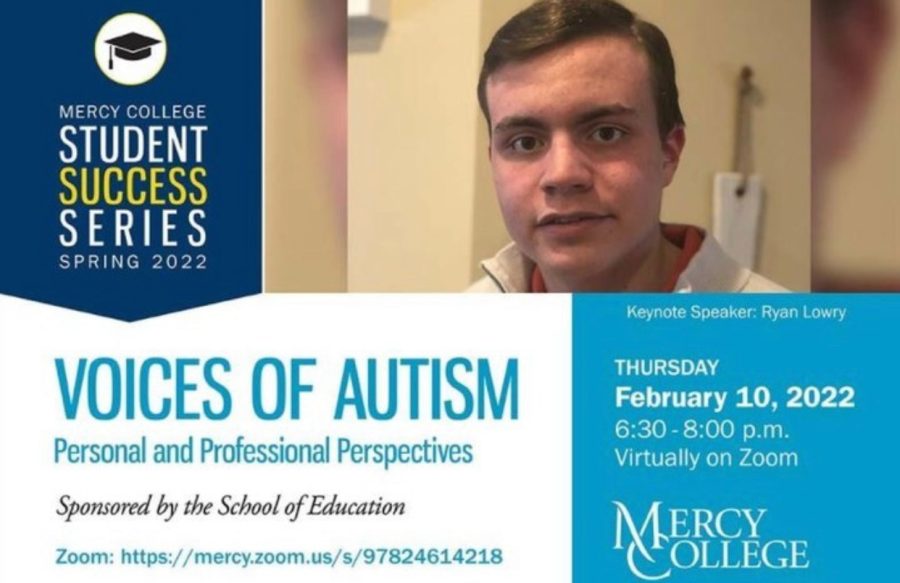The Highs and Lows of Ryan Lowry: A Voices of Autism Event
At 18-months, he was diagnosed with autism, mainly non-verbal, and found his voice through therapy over time. With a letter, he shared his goal to demonstrate to companies that he can learn, and learn quickly.
He wants to be an animator, but his ultimate goal is for companies to take a chance on him.
It started as a job search and a letter posted on his LinkedIn, a bold move that overnight went viral. Companies all across the world reached out to 21-year-old Ryan Lowry after reading his handwritten note. A letter he had written to his future employers.
Tracy and Rob Lowry, Ryan’s mother and father, reminisced on the challenges they faced along this journey, well before the LinkedIn letter. After years and long hours of applied behavior analysis, the Lowrys had discovered their first mean of communication with Ryan.
“It was a way for him and our world to come together. In the same place at the same time,” said Tracy Lowry.
An interchangeable world made possible through the sound waves of music therapy.
“It’s not easy, but he does it,” said Tracy. “It’s an emotional roller-coaster, there are so many lows, but there are so many highs.”
After finding his voice, Ryan was able to be understood by the world, but to his family, he has always been a reckoning force, taking one day and one step at a time, remaining unstoppable.
Cherishing the highs and outcoming the lows.
At the beginning for Rob Lowry, the thought of autism was out of the question, something he says one would expect with other children but never with one’s own.
“I was in denial. When he was diagnosed, it was a really bad day,” he recalled. “We are going to cure him.”
It was a long process of discovery until it clicked for Rob Lowry that his son’s diagnosis did not mean he needed to be saved.
He agrees that now the world is coming around to embrace autism and embrace the strengths and benefits that come from it.
At the Voices of Autism speaker event organized by the school of education at Mercy College, Ryan and Rob Lowry sat next to each other by the computer, the event was held online with no restrictions, but the Lowrys sat at designated chairs. They stared back at the various strangers with questions and praises, eager to learn about their routine.
It seems simple. Every night at dinnertime, they play a game.
Rob: “You have to have a high, you don’t have to have a low.”
Ryan: “I have to have a high, and I don’t have to have a low.”
Rob: “What was your high today?”
Ryan: “My high was that I got into this very meeting spot.”
The Lowrys main focus now is to help Ryan reach a level where he can feel comfortable being independent and having a source of income to support himself. With Ryan’s letter, a new light was shed, increasing the awareness on the lack of employment for people with autism.
“He can live with us for the rest of our lives,” Rob reflected. “But the problem is, at some point, we are not going to be here.”
Rob Lowry stressed the need for individuals with autism and their need for independence, and he emphasized the importance of educational therapy resources.
Dr. Sudha Ramaswamy, a specialist in the field of autism, highlighted the benefits of occupational therapy as an example of developmental therapy. This type of treatment is essential to help people with ADS live as independently as possible, teaching skills like; eating, dressing, bathing, and relating to people.
In 2012, a report by the U.S. Department of Labor indicated that only 16.2 percent of students with disabilities become employed after high school and fewer with autism. In 2020, the data saw an increase of 20 percent of employment for students with disabilities.
Behavior analyst Dr. Anjalee Nirgudkar offers transition support and specializes in creating opportunities for adults like Ryan.
Dr. Nirgudkar highlighted The Workplace Innovation and Opportunity Act (WIOA), a service to assist those with significant barriers with quality jobs and careers, by giving equal rights of employment, as well as the Pre-Employment Transition Services (Pre-ETS), transitioning services provided by most public and private schools designed to help students ages 14 to 21 with disabilities.
“We still have a really long way to go,” said Nirgudkar.
Through the help of ABA therapy and music therapy, Ryan has been able to learn how to communicate properly and enroll in an animation program at Exceptional Minds Professional Training Academy and Studio.
Ryan reflected, “I just want to say that I’m just a person with highs and lows, and like my parents say, typical is overrated.”

Nicole Alarcon is a senior at Mercy College, majoring in journalism. Born in São Paulo, Brazil, she moved to the United States at 10-years-old.
Nicole...








